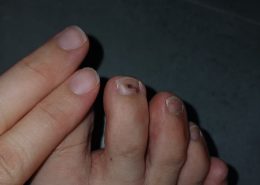My hands were freezing during sleep what could be the reason and what could be the solution
The sensation of a trickling feeling at the back of the throat, often referred to as postnasal drip, is a common symptom that can persist even after an episode of sinusitis has resolved. Here are some insights and considerations regarding your situation: Possible Causes and Considerations: 1. ResiduRead more
The sensation of a trickling feeling at the back of the throat, often referred to as postnasal drip, is a common symptom that can persist even after an episode of sinusitis has resolved. Here are some insights and considerations regarding your situation:
Possible Causes and Considerations:
1. Residual Inflammation: After sinusitis, the inflammation of the nasal passages and sinuses can persist, leading to ongoing mucus production and postnasal drip. This can cause a sensation of mucus trickling down the throat, which may trigger a cough.
2. Chronic Sinusitis: If symptoms persist for more than 12 weeks, it may indicate chronic sinusitis. This condition is characterized by prolonged inflammation and may require different management strategies.
3. Allergies: Allergic rhinitis can cause similar symptoms, including postnasal drip and cough. Consider whether you have been exposed to allergens such as pollen, dust mites, or pet dander.
4. Gastroesophageal Reflux Disease (GERD): Sometimes, GERD can mimic or exacerbate postnasal drip symptoms, as stomach acid can irritate the throat.
5. Environmental Factors: Dry air, especially in heated indoor environments, can exacerbate postnasal drip. Humidifiers can help maintain moisture in the air.
Management Strategies:
– Nasal Irrigation: Continue using saline nasal rinses to help clear mucus and reduce postnasal drip.
– Hydration: Ensure adequate fluid intake to help thin mucus secretions.
– Avoid Irritants: Avoid smoking and exposure to secondhand smoke, which can worsen symptoms.
– Allergy Management: If allergies are suspected, consider using antihistamines or nasal corticosteroid sprays as advised by your healthcare provider.
– Humidification: Use a humidifier in your living space to maintain optimal humidity levels.
When to Seek Further Evaluation:
– If symptoms persist beyond a few more weeks or worsen, it would be prudent to consult with your healthcare provider.
– If you experience additional symptoms such as fever, severe facial pain, or visual disturbances, seek medical attention promptly.
Your healthcare provider may consider further evaluation, including imaging studies or referral to an ENT specialist, to determine if there are underlying issues such as nasal polyps or chronic sinusitis that require specific treatment. Additionally, they may assess for other conditions like GERD or allergies that could be contributing to your symptoms.
See less


Experiencing cold hands during sleep can be attributed to several factors, and understanding the underlying cause is essential for determining the appropriate solution. Here are some potential reasons and corresponding solutions: 1. Environmental Factors: - Cold Room Temperature: If the room is tooRead more
Experiencing cold hands during sleep can be attributed to several factors, and understanding the underlying cause is essential for determining the appropriate solution. Here are some potential reasons and corresponding solutions:
1. Environmental Factors:
– Cold Room Temperature: If the room is too cold, it can lead to cold extremities.
– Solution: Ensure that your sleeping environment is adequately heated. Use additional blankets or a warmer duvet, and consider wearing thermal sleepwear or gloves to bed.
2. Circulatory Issues:
– Raynaud Phenomenon: This condition causes blood vessels in the fingers to constrict more than usual in response to cold or stress, leading to cold, discolored fingers.
– Solution: Keep your hands warm by wearing gloves, even indoors if necessary. Avoid caffeine and smoking, as these can exacerbate symptoms. If symptoms persist, consult a healthcare professional for potential medication options.
3. Peripheral Neuropathy:
– Conditions such as diabetes or other nerve-related issues can lead to altered sensations in the hands, including coldness.
– Solution: If you suspect neuropathy, it is important to manage any underlying conditions, such as maintaining blood sugar levels in diabetes. Consult with a healthcare provider for a comprehensive evaluation and management plan.
4. Poor Circulation:
– This can be due to various factors, including sleeping positions that restrict blood flow.
– Solution: Ensure you are sleeping in a position that does not compress your arms or hands. Regular exercise and stretching can improve overall circulation.
5. Hypothyroidism:
– An underactive thyroid can lead to cold intolerance and cold extremities.
– Solution: If you have other symptoms of hypothyroidism, such as fatigue, weight gain, or dry skin, consider getting your thyroid function tested by a healthcare provider.
6. Anemia:
– Low levels of hemoglobin can lead to poor oxygen delivery to tissues, causing cold hands.
– Solution: Ensure a diet rich in iron, vitamin B12, and folate. If anemia is suspected, a blood test can confirm the diagnosis, and appropriate supplementation or dietary changes can be made.
If your symptoms persist or are accompanied by other concerning signs, it is advisable to seek medical evaluation to rule out any underlying health issues. A healthcare professional can provide a tailored approach based on a comprehensive assessment of your symptoms and medical history.
See less